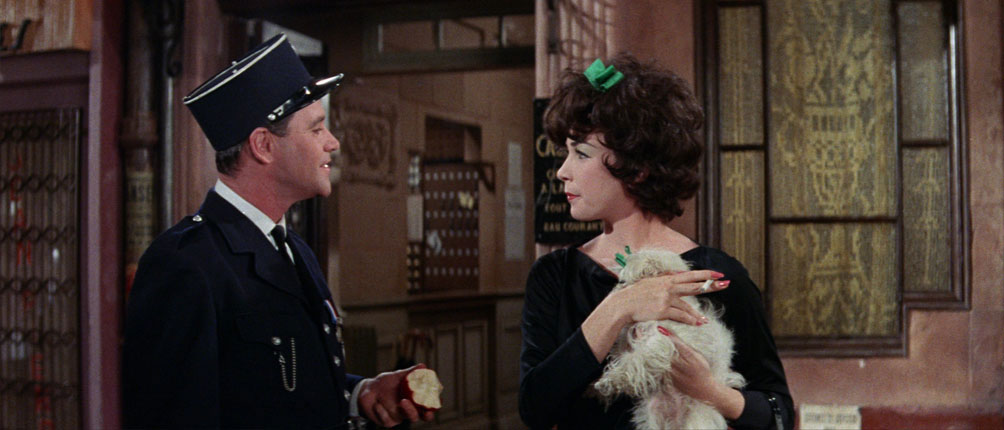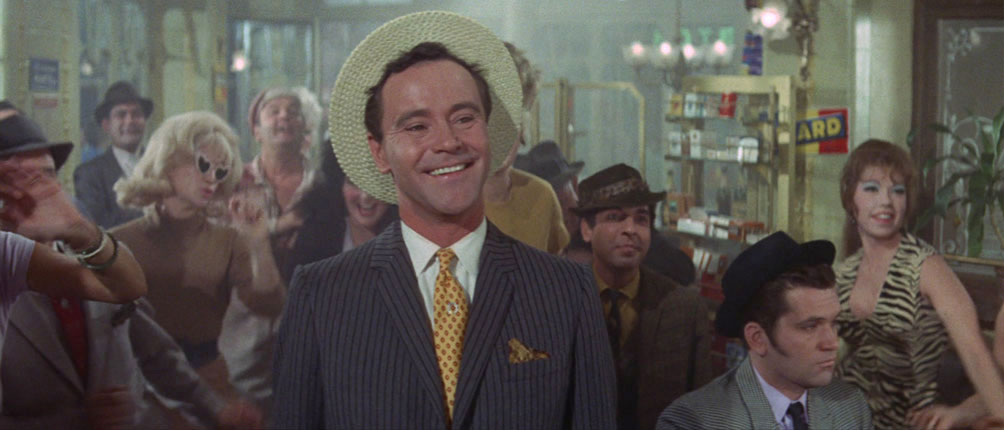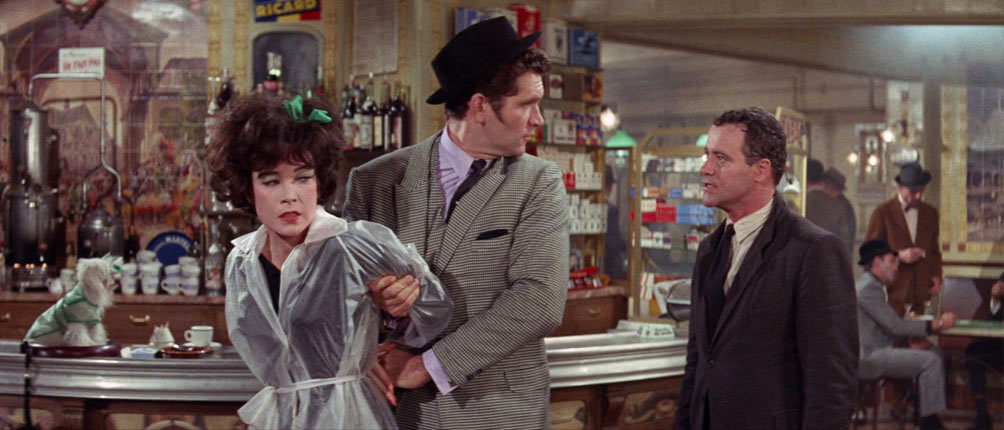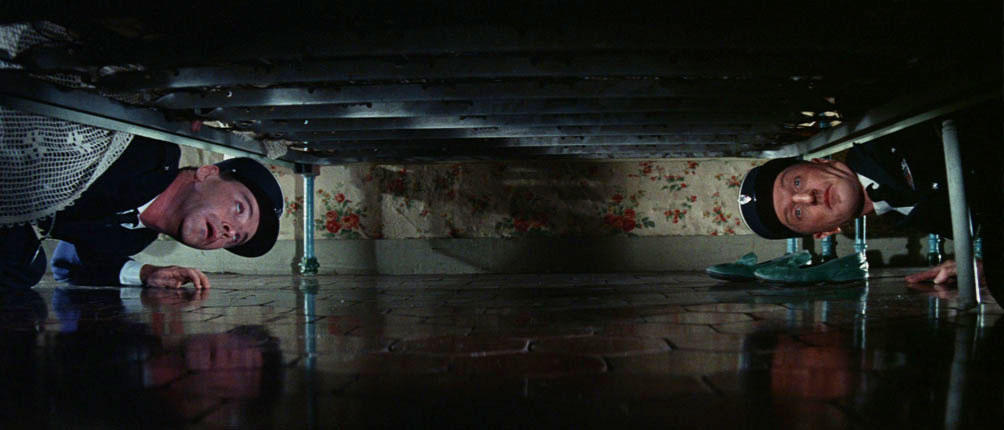| |
"There is no guaranteeing audience reaction," Wilder said at the time of Irma's release. "I've been lucky; I've taken a lot of chances in treading new ground, which could have slipped out from under me... ...I have to live in hope – or perhaps under the delusion – that if I like it, a great many other people will like it too." |
| |
Some Like It Wilder by Gene D. Phillips |
Cometh the technology, cometh the tome. When actually owning movies became a reality at the dawn of the video age (a magazine ad for a £39.99 VHS copy of The Exorcist rather self-importantly announced "Seen by the many. Owned by the few."), we needed help to figure out what was worth recording, keeping, wiping or ignoring. US critic Steven H. Scheuer (with presumably a little help from a few other critics) compiled one of the first chunky paperbacks with capsule reviews for over ten thousand films. Yes, Leslie Halliwell had previously trod that particular path but his film guide had a parochial bias, one that soured his reviews. He was honest enough to admit this in his 1978 essay The Decline and Fall of the Movie in which he said "Where is the good humour in Jaws?" After that provably nonsensical statement, he'd lost the plot and me for good. In the Scheuer guide, my own copy now front and back coverless from overuse, the movie title is listed, its year and a one to four star rating judgement was followed by a paragraph capsule review. The review of Billy Wilder's Some Like It Hot rewrote the definition of 'gushing' ("...an incredibly funny, imaginative farce that may well be the most hilarious American movie made in this generation.") Well, that sold it. Add to that, it ends with "...Joe E. Brown delivers the last line as a classic topper!" My friend and I at the time (we were still in our teens) could not wait to catch this film on broadcast TV (how else were we to see it?) and we didn't really know what a 'classic topper' was but we were rabid to find out. Well, the question is, does humour time travel? From 1959 to '79, uh, not so well. Wilder's more cynical fare like the phenomenally powerful Ace in the Hole seems age-proof by comparison. But humour? Humour seems more culturally rooted. What we were laughing at in the '70s does not bear repeating unless it's Tommy Cooper who managed to be naturally and incredibly funny while taking pot shots at no one (maybe a mother-in-law gag sneaked in once or twice). When we finally saw Some Like It Hot, my friend and I had ironically lukewarm reactions all the way through but were assured of a smile at the end, surely. Jack Lemmon in women's clothing is fending off advances from a rather idiotic flirt planning to marry clearly a man in drag. They're on a motor-boat filmed against an obvious studio background. Trying to put him off still in 'Daphne''s clothing, Lemmon fails and is forced to pull off his wig and announce "I'm a man!" The idiot, without missing a beat, replies "Well, nobody's perfect."
Picture this...
Tumbleweed rolls by with a soft wind subtly combined with a haunting church bell. Apart from the fact that this idiot was so idiotic, he was no longer any kind of believable human character, that line actually makes no sense at all. My friend and I just looked at each other open mouthed. Now we knew what a 'topper' was and we could not have been less underwhelmed. This of course sprang from our expectations based on that one small paragraph of a review. So Wilder's later Irma La Douce (intended as another vehicle for Marilyn Monroe and Jack Lemmon, somewhat scuppered by the former's death) was not shooting up to the top of my 'must see' lists despite the immense respect and admiration I had for Wilder himself. And it's been one of those titles that was so well known but I never got around to seeing it. I just broke my duck, and am glad I did but there are elements of the film – despite its obvious farcical nature – that you have to crank your suspension of disbelief up to eleven to even begin to accept.

Nestor is a rookie Parisian cop (one assumes the characters are still all French as it's based on a famous French musical), and as such is innocent, inflexible and utterly unaware of the tidy and mutually beneficial relationship the streetwalkers have with their pimps and policemen. The principal set, the literal street where the girls ply their trade, is self contained, clean and colourful in a way an area like that in reality only aspires to be. I like the detail that the set was dressed with actual French metalwork and it all looks suitably Gallic. There's a bar where the pimp gang hangs out run by Moustache, the proprietor. One of the girls, Irma with her idiosyncratic green bow, green tights and a lap dog, seems to be the most popular. She manages to con her Johns out of a bit of extra cash with a few sob stories. Nestor finally puts two and two together and bundles all the girls off to a police cell. Through simple bad fortune, it appears he has also taken a bribe and is fired from the force. Down on his luck, he returns to the bar, gains some unlikely respect from his even more unlikely pugilistic prowess and falls hard for Irma. It's around about here a question formed in my mind, which really needs to be asked... What man/woman in love with a woman/man (select your own pairing) would cheerfully accept the object of their love toiling as a sex worker? Yes, Nestor eventually faces up to that reality and has a ridiculous idea to solve that sordid problem. The answer involves a disguise many times less believable than all the Clark Kents in the various Superman incarnations. It's at this point that every time the disguised Lemmon and Irma shared scenes, I'd be running the following over in my head "Irma, are you kidding me? It's Nestor with fake teeth! Get a grip!" But I'm not sure that was the intention of Wilder's and I.A.L. Diamond's screenplay. After all, the words 'romp' and 'farce' do not balance well on the knife-edge of actuality. Still, let's move on.
Nestor as played by Jack Lemmon was probably at the time his quintessential part, a harassed, down on his luck, all American hero (French! Pardonnez-moi) who glides through movies with buckets of charm and a gift in comic timing and less of a gift being in disguise but then that's not Lemmon's area. Irma, as played charmingly by Shirley MacLaine has an effortless chemistry with Lemmon and their scenes together are mostly delightful as long as you don't imagine too much about what must go on in her designated hotel room day after day, John after John, Mathieu, Marque, Luc and so on. The supporting cast feature a few potent surprises. Playing the role for which Charles Laughton was ear-marked before he, like Marilyn, died before production started is Lou Jacobi as Moustache. Known for his TV work, his performance in the film is a loving creation of a character that knows how everything operates and finds some warmth towards the naïf ex-gendarme despite his better judgement. Two potential 'Johns' are played by Sonny Corleone and the 'incroyable 'Ulk' – James Caan and Bill Bixby respectively. But the nicest cast surprise was one of the prostitutes, an extraordinarily familiar face for those of my vintage. In the Enterprise's first year of voyages in the original series, Captain Kirk had a female yeoman. He even said of her as if her obvious appeal might put Kirk's concentration at risk, "When I get my hands on the Headquarters genius that assigned me a female yeoman..." Hullo to Grace Lee Whitney, yeoman Janice Rand. The other outstanding female in the role of a prostitute is Tura Satana, the extraordinary alpha female from Russ Meyer's Faster Pussycat, Kill, Kill.

Wilder's Parisian coverage (second unit no doubt for the most part) includes a meat market, which for Wilder was heavy handed symbolism of prostitution at its heavy weightiest. The fact that Lemmon ends up working there (and these scenes are enough to convert a few meat lovers into vegans) is neither here nor there. That phrase is worth unpacking. Neither here nor there. So where the fuck is it? Then we have André Previn whose death a few weeks ago was very sad news – hunt down his wonderful memoir of his time in Hollywood, No Minor Chords. It might be galling to his memory to be most famous for being the butt of the genius of comedian Eric Morecombe but there we are – neither here nor there. He adapted the score of the original musical and created a wonderfully memorable, light orchestral work, one for which he received an Oscar. More importantly he composed music that gave the audience permission to treat the tale as a farce or a comedy. The music said "It's OK! It's fine! Laugh away!" "Have no thoughts of the reality of the life of a prostitute!" Apologies. That's not meant as a criticism of the score. It's more about tone. There are a few moments that elicit questions beyond the farce. Where did Nestor get the strength to prise open the iron bars of his prison cell and how exactly do the filmmakers square the men on women violence with the lightness of touch needed to make a farce like this work? Wilder is a miracle worker. It just works. Just.
Presented in the 2.35:1 aspect ratio, Irma looks delicious with that pleasing film softness and vibrant colour beautifully showcased on this Blu-ray release. There was no noticeable damage from dust spots or drying marks and it's a visual treat all over.
The LPCM Mono audio has lost none of its clarity or perhaps that clarity has been enhanced in the restoration process. Previn's lively score has a satisfactory dynamic range although the score and soundtrack rarely take advantage of the more modern systems we are used to but then that's to be expected.
There are optional English SDH subtitles.
Brand New and Exclusive Interview with film scholar Neil Sinyard (26' 43")
The ever reliable Sinyard gives us the context of the film including Wilder's assertion that 'it didn't work' when its financial success clearly contradicts this. There's a lovely idea he brings up that innocence is something that attracts the experienced but an aspect that will be inevitably eroded by contact with the said experienced. It's a bit like the second commentator, Joseph MacBride shedding off his Catholic upbringing by eventually daring to see Irma all the way through... It's quite a shock to find out that Jean Luc Godard was a fan. Sinyard, clearly a fellow devotée, notes that eighty per cent of the comedy is delivered by Lemmon but when MacLaine has a chance to shine she does so with some brio.

Feature Length Audio Commentary by critic and film historian Kat Ellinger
Ellinger's a huge Wilder fan and her mission for this commentary is to acknowledge Wilder's transgressive nature and how he pushed and pushed when it came to the restrictive Hays Code, Hollywood's somewhat ridiculous 'guidelines' for avoiding moral turpitude in movies. Two of my personal favourites were that women in love scenes had to have one foot on the floor and it was forbidden for actors to kiss while horizontal! In 1963 US cinema had some catching up to do when it came to presenting more risqué material. Ellinger links, of all people, independent sexploitation auteur Russ Meyer with Wilder in terms of their risk-taking. The actress Tura Satana plays a prostitute in Irma (her film debut) and stakes a claim, as mentioned before, to independent immortality as the murderous go-go dancer in Meyer's classic Faster, Pussycat! Kill! Kill! Both Lemmon and MacLaine get their fair share of appreciation. Prostitution is examined (the two ways of presenting it on film is through the fallen woman or the celebrant, OK). Ellinger also knows her Wilder stories and talks about Wilder as a gigolo, a tale I'd not heard about the great man before. What's the oral equivalent of a typo? Unless I misheard, she mentions "...D.W. Griffin (twice) adapting The Resurrection in 1909." Unless my history is as bad as my hearing, she must mean D.W. Griffith. Italian cinema comes under consideration as Ellinger explores the role of the prostitute in world cinema. Wilder's appreciation of fellow director Ernst Lubitsch is examined as is Hal Wallis's letter of outrage regarding Irma. He could not believe that Billy Wilder could have been so depraved to have made it! Today, Irma La Douce is tamer than a puppy party. Ellinger notes that "Sex sells, even implied sex!" and delves into the cinematic history of masquerade, one of my silly issues with the film. It's a ramble but a remarkably well-informed ramble with off the cuff information on all the films she references. She even admits that she's not even scratched the surface in her appreciation of Wilder. Maybe the next commentary will fill in any gaps. All in all, it's a pleasure to spend quality time with Kat Ellinger.
Feature Length Audio Commentary by film historian Joseph McBride
"It will strike a happy medium between Tennessee Williams and Walt Disney..." So McBride quotes Wilder which sort of sums the movie up. Our commentator admits to an old fashioned Catholic upbringing and had to try many times to see the complete movie as certain scenes offended him to the point of leaving the theatre multiple times.

Note: picking up the review here on the day before release, I lost my landline, broadband and I have no mobile signal. We're talking overhead copper cables snapped and dangling. It is extraordinary how much a part of one's life the internet becomes. The next four lines prompted me to Google six questions all of which, like many others, will remain unanswered. Have already had a call from an engineer and I'm looking at being offline for two days... Forgive any errors that I wasn't able to fact check.
Like Ellinger, McBride certainly knows his Wilder. He quotes G.K. Chesterton in describing a parallax (he says 'parallax' I'm sure, three times but it still might be 'paradox'). McBride is trying to get over the idea that Irma is about our base humanity but also very sweet. I know what a parallax is but this sure sounds more like a paradox. I can't even Google McBride's specific nationality, which would give me a clue to what kind of American accent he's sporting. Onwards. Sorry, the Chesterton definition of parallax/paradox quote was "the truth standing on its head to get your attention." He makes a good point about how much writers and directors want to impart to an audience. He mentions Ernst Lubitsch and 'the Lubitsch touch' an oft-quoted mastery of detail. You can say that two and two are four but if you just say two and two and the audience provides the four, then people will love you for it. Kubrick used to say the same thing. McBride takes a pause over his favourite scene (Lemmon undresses slowly and shyly and puts the dog out). Ah, he says 'paradox' twice again later. Phew. Glad that's sorted. McBride notes that there's no sex (in 1963, understandable) but he also mentions there's no kissing. Irma and Nestor share a tender kiss at one hour, one minute and twelve seconds in. I have no wish to spoil any more of this excellent commentary but I will share one poignant Wilder quote when faced with holocaust deniers... "I have one question for holocaust deniers. Where's my mother?" Punch duly packed.
Trailer (3' 52")
The majority of this trailer is basic 2D cell animation with some very imaginative versions of the actors in question. It essentially explains the plot and the milieu very much like the Louis Jordan voice over at the start of the actual feature. Keeping sex front and centre, we have MacLaine flouncing in skimpy clothes, a naked back and a spirited chest wiggle in a police van to remind audiences that this is risqué stuff.
A Collector's booklet featuring a new essay by Richard Combs, alongside a wide selection of rare archival imagery.
Not available for review.
Irma La Douce is Wilder's most commercially successful film so audiences certainly weren't put off by the more squalid aspects of the story. But Wilder was somewhat dismissive of it looking back on the film. Of all of the aspects of his own work to disparage, it was the idea of American actors playing foreign roles set in foreign countries that made him so self-critical. Personally, I have no problem with that. Irma La Douce is sumptuous to look at, beautifully played by the leads and has a sweetness suffused with the sordid subject matter that just about allows you to indulge yourself and go with the love story. And, hey. It's Billy Wilder at the height of his studio fame. Well recommended.
|